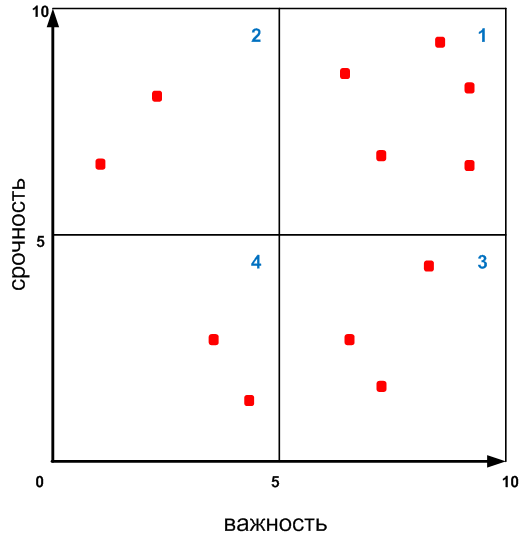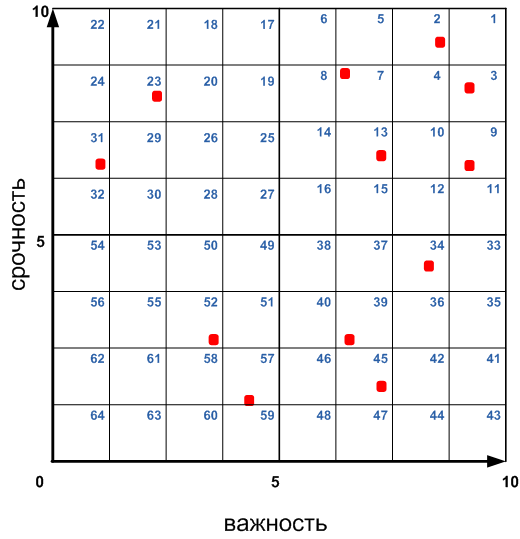About how to put chaos in order, do it every day, and not waste time on it
I appeal to you, collective habrazum, with this question. Does my idea have a right to life, or a place for her in a closet with other "bicycles"?
But the idea is this.
I am a web studio project manager. And every day in the process of processing I have at least a dozen tasks. From small operational to more serious and lengthy. For competent ranking most often there is neither time nor desire. As a result, chaos.
The same thing happens with performers. The contractor is assigned several tasks, and he is most often not interested in how long they are assigned. He can begin to do the task, the urgency of which is small, simply because he did not see its timeline. Or get the task in advance, but by the time of its relevance forget about it. Determining the sequence of tasks, reminding and control rests with the manager, who already has enough tasks.
In the end, it all comes down to the fact that every day you have to draw up a detailed plan of action not only for yourself, but also for each artist. But this time, effort. And I want to somehow optimize this routine task.
And here’s the idea itself: to create a system that automatically creates and updates a sequential list of tasks based on the data of project schedules.
This is a task pool with assigned resources and defined deadlines. For example, we assume that they are taken from Redmine, in which I lead all the projects. We also take into account that the schedules are kept up to date, and the contractor a priori cannot receive tasks that are physically impossible to complete (for example, typesetting cannot start earlier than design).
The calculations are based on the Eisenhower method. Who is not familiar, google to help. I will only briefly describe how this works. All tasks are evaluated on a 10-point scale according to two characteristics: urgency and importance. Then, a coordinate graph is compiled, where the X axis is Importance, the Y axis is Urgency. Tasks are set according to the values (red dots in the image). The schedule is divided into 4 quadrants, and then a sequence is drawn up according to the principle: 1. Important-Urgent, 2. Unimportant-Urgent, 3. Important-Non-Urgent, 4. Not important-Non-Urgent.

Here by the way is a good solution for this method: http://habrahabr.ru/blogs/services/98591/
I really liked it. Although not too convenient for me, I use it periodically. Well done guys, thanks.
The first problem we are facing is “What to do with tasks that fall into one quadrant?”, Which are both urgent and important. And everything turns out to be simple. It is necessary to divide this quadrant according to the same principle, and so on to the necessary degree of detail. For example, I shared two more times.

Now the sequence of tasks is quite obvious (numbered in blue numbers).
The complexity of the second. How to assign existing tasks the necessary status of importance and urgency? And if importance is a constant, then what to do with urgency that changes constantly?
Importance from a technical point of view is solved quite simply. Probably, in any task manager there is a field “status” or “priority”. It is just suitable for our purposes. In Redmine in particular, you can even set up a guide to assign points.
Importance is assigned to the task at the stage of its appearance (creation) and in accordance with the situation. Here, I am afraid, there is nothing special to automate. The quality of the appointment of Importance depends on the qualifications and experience of the manager.
As for Urgency, I found this way out. Link the Urgency score to the task start date. That is, let's say we have a task that begins in 2 days, its Urgency will be 8. And there is a task that should begin today, its Urgency will be 10.
But this will only work if the task is given a deadline exactly for its completion, and not so that "here you have the task for two hours and the deadline for a week, do it when you want, but so that the task is ready by the end of the week." Although in this case the system will work, it’s just not so effective.
Well, perhaps the whole idea. There is, of course, where and what to finalize. And the formula needs to be developed and thought over how to combine long-term tasks (over 6-8 hours) with small operational ones, and much more.
Anticipating the comments of programmers, I want to note that here I tried to solve only a logical problem. I did not consider methods of technical implementation. In any case, I will accept all comments, both positive and negative. Preference is constructive.
Thank you for
your attention!
But the idea is this.
I am a web studio project manager. And every day in the process of processing I have at least a dozen tasks. From small operational to more serious and lengthy. For competent ranking most often there is neither time nor desire. As a result, chaos.
The same thing happens with performers. The contractor is assigned several tasks, and he is most often not interested in how long they are assigned. He can begin to do the task, the urgency of which is small, simply because he did not see its timeline. Or get the task in advance, but by the time of its relevance forget about it. Determining the sequence of tasks, reminding and control rests with the manager, who already has enough tasks.
In the end, it all comes down to the fact that every day you have to draw up a detailed plan of action not only for yourself, but also for each artist. But this time, effort. And I want to somehow optimize this routine task.
And here’s the idea itself: to create a system that automatically creates and updates a sequential list of tasks based on the data of project schedules.
So, what do we take as input.
This is a task pool with assigned resources and defined deadlines. For example, we assume that they are taken from Redmine, in which I lead all the projects. We also take into account that the schedules are kept up to date, and the contractor a priori cannot receive tasks that are physically impossible to complete (for example, typesetting cannot start earlier than design).
Methodology
The calculations are based on the Eisenhower method. Who is not familiar, google to help. I will only briefly describe how this works. All tasks are evaluated on a 10-point scale according to two characteristics: urgency and importance. Then, a coordinate graph is compiled, where the X axis is Importance, the Y axis is Urgency. Tasks are set according to the values (red dots in the image). The schedule is divided into 4 quadrants, and then a sequence is drawn up according to the principle: 1. Important-Urgent, 2. Unimportant-Urgent, 3. Important-Non-Urgent, 4. Not important-Non-Urgent.

Here by the way is a good solution for this method: http://habrahabr.ru/blogs/services/98591/
I really liked it. Although not too convenient for me, I use it periodically. Well done guys, thanks.
Difficulties
The first problem we are facing is “What to do with tasks that fall into one quadrant?”, Which are both urgent and important. And everything turns out to be simple. It is necessary to divide this quadrant according to the same principle, and so on to the necessary degree of detail. For example, I shared two more times.

Now the sequence of tasks is quite obvious (numbered in blue numbers).
The complexity of the second. How to assign existing tasks the necessary status of importance and urgency? And if importance is a constant, then what to do with urgency that changes constantly?
Importance from a technical point of view is solved quite simply. Probably, in any task manager there is a field “status” or “priority”. It is just suitable for our purposes. In Redmine in particular, you can even set up a guide to assign points.
Importance is assigned to the task at the stage of its appearance (creation) and in accordance with the situation. Here, I am afraid, there is nothing special to automate. The quality of the appointment of Importance depends on the qualifications and experience of the manager.
As for Urgency, I found this way out. Link the Urgency score to the task start date. That is, let's say we have a task that begins in 2 days, its Urgency will be 8. And there is a task that should begin today, its Urgency will be 10.
But this will only work if the task is given a deadline exactly for its completion, and not so that "here you have the task for two hours and the deadline for a week, do it when you want, but so that the task is ready by the end of the week." Although in this case the system will work, it’s just not so effective.
In conclusion
Well, perhaps the whole idea. There is, of course, where and what to finalize. And the formula needs to be developed and thought over how to combine long-term tasks (over 6-8 hours) with small operational ones, and much more.
Anticipating the comments of programmers, I want to note that here I tried to solve only a logical problem. I did not consider methods of technical implementation. In any case, I will accept all comments, both positive and negative. Preference is constructive.
Thank you for
your attention!
